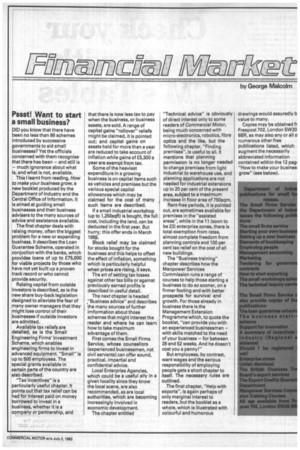by George Malcolm
Page 67

If you've noticed an error in this article please click here to report it so we can fix it.
Pssst! Want to start a small business?
DID you know that there have been no less than 86 schemes introduced by successive governments to aid small businesses? Yet the officials concerned with them recognise that there has been — and still is — much ignorance about what is, and what is not, available.
This I learnt from reading, How to make your business grow, a new booklet produced by the Department of Industry and the Central Office of Information. It is aimed at guiding small businesses and their business advisers to the many sources of advice and assistance available.
The first chapter deals with raising money, often the biggest problem for a new or expanding business. It describes the Loan Guarantee Scheme, operated in conjuction with the banks, which provides loans of up to £75,000 for viable projects by those who have not yet built up a proven track record or who cannot provide security.
Raising capital from outside investors is described, as is the new share buy-back legislation designed to alleviate the fear of many owner managers that they might lose control of their businesses if outside investors are admitted.
Available tax reliefs are detailed, as is the Small Engineering Firms' Investment Scheme, which enables engineering firms to invest in advanced equipment. "Small" is up to 500 employees. The special grants available in certain parts of the country are also described.
"Tax incentives" is a particularly useful chapter. It points out that tax relief can be had for interest paid on money borrowed to invest in a business, whether it is a company or partnership, and that there is now less tax to pay when the business, or business assets, are sold. A range of capital gains "rollover" reliefs might be claimed, it is pointed out; and capital gains on assets held for more than a year are reduced to take account of inflation while gains of £5,300 a year are exempt from tax.
Some of the heaviest expenditure in a growing business is on capital items such as vehicles and premises but the various special capital allowances which may be claimed for the cost of many such items are described.
If a small industrial workshop (up to 1,250sqft) is bought, the full cost, including the land, can be deducted in the first year. But hurry; this offer ends in March 1985.
Stock relief may be claimed for stocks bought for the business and this helps to offset the effect of inflation, something which is particularly helpful when prices are rising, it says.
The art of setting tax losses against other tax bills or against previously earned profits is described in useful detail.
The next chapter is headed .."Business advice" and describes the many sources of further imformation about those schemes that might interest the reader and where he can learn how to take maximum advantage of them.
First comes the Small Firms Service, whose counsellors (experienced businessmen, not civil servants) can offer sound, practical, impartial and confidential advice.
Local Enterprise Agencies, which could be a useful ally in a given locality since they know the local scene, are also recommended, as are local authorities, which are becoming increasingly involved in economic development.
The chapter entitled "Technical advice" is obviously of direct interest only to some readers of Commercial Motor, being much concerned with micro-electronics, robotics, fibre optics and the like, but the following chapter, "Finding premises", is useful to all. It mentions that planning permission is no longer needed to change premises from light industrial to warehouse use, and planning applications are not needed for industrial extensions up to 20 per cent of the present area, subject to a maximum increase in floor area of 750sqm.
Rent-free periods, it is pointed out, are sometimes available for premises in the "assisted areas", while in the 11 (soon to be 23) enterprise zones, there is total exemption from rates, almost complete freedom from planning controls and 100 per cent tax relief on the cost of all new buildings.
The "Business training" chapter describes how the Manpower Services Commission runs a range of courses to help those starting a business to do so sooner, on a firmer footing and with better prospects for survival and growth. For those already in business there is the Management Extension Programme which, to quote the booklet, "can provide you with an experienced businessman — with skills matched to the need of your business — for between 26 and 52 weeks. And he doesn't cost you a penny!"
But employees, by contrast, want wages and the serious responsibility of employing people gets a short chapter to itself, The necessary rules are outlined.
The final chapter, "Help with exports", is again perhaps of only marginal interest to readers, but the booklet as a whole, which is illustrated with colourful and humorous drawings would assuredly b value to many.
Copies may be obtained fr Freepost 702, London SW20 8BR, as may also any or all o numerous other free publications listed, which augment the necessarily abbreviated information contained within the 12 pagi "How to make your busines grow" (see below).




































































































